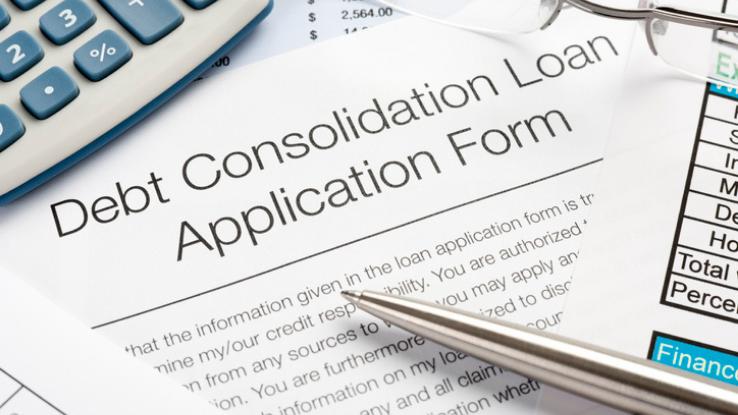Easy Ways to Pay Off Credit Card Debt

Credit card debt is easy to get into and hard to get out of. Repaying that debt can become even more burdensome when you carry a balance on multiple credit cards, with different monthly payment dates and different interest rates. It's not uncommon for credit card debt to result in hundreds or thousands of dollars per month in minimum payments and interest. Each month you don't pay the balance in full, you accrue more interest and your principal grows.
If you have found yourself in this situation, know that you're not alone. A 2021 study by LendingTree found that 45.4% of American families carry some amount of credit card debt. When this debt begins to feel overwhelming, many turn to debt consolidation loans. If you're considering this move, you likely have questions. What are all the methods for debt consolidation? Is debt consolidation right for you? We've written this guide to help answer these questions and more.
Debt consolidation is the practice of moving multiple debts you owe to a single company. You still need to pay back the same amount of debt. However, you only have one creditor and a single monthly minimum payment, due date, and interest rate. Debt consolidation also typically lowers the interest rate, which frees up more of your monthly income so that you can stay on top of other expenses or pay down your principal more each month.
Ways to Consolidate Credit Card Debt

Balance Transfer Card
Some credit cards allow for balance transfers. This means the new credit card company lets you use your available balance to pay off another credit card. The new credit card company either pays your other creditors directly or sends you a check that you can write to pay off existing credit card debt, transferring that balance to your new card.
There is usually a 2-5% fee for completing a balance transfer, though some credit card companies have an introductory offer for balance transfers. In this case you may pay as little as zero percent interest on the transfer for a specified period, sometimes up to 12 or 18 months. If you already have a balance transfer card, talk to your credit card company. They may offer balance transfer promotions for existing customers.
A balance transfer puts all your debt on a card with no interest. If you have $500 to pay down your debt each month, the entire $500 goes towards shrinking your principal. If you fail to pay the full balance by the end of the promotional period, though, monthly interest will accrue on one card with a high balance. A balance transfer is a good strategy if you get a promotional interest-free offer and are able to pay down all or most of your debt within that interest-free window. However, if you struggle to make monthly payments or are currently only able to pay the minimum balance on your cards, a balance transfer card could cost you more in the long run, due to the high interest rate that kicks in after the initial promotional period.
Equity Loans from Assets
If you own a car, motorcycle, home, RV, or boat, some lenders will let you borrow against the equity you have in those assets. You can get a loan for all or a portion of the value of your asset, and you can use your asset as collateral.
Interest rates can vary drastically. However, both the interest and loan terms are usually more friendly if you borrow against the equity in your home rather than another asset. The biggest drawback is the potential to lose your home or vehicle if you cannot repay the loan. In the right circumstances, though, this can be a great way to save on interest, as lenders see these loans as lower-risk due to the collateral.
Tap Into Investments
Some 401(k) plans allow you to take out a loan from your retirement savings. There are no credit checks, so this may be one of a few good options if you have bad credit. There will be interest (usually in the single digits) on the loan, and if you make late payments or default on your loan, you could get taxed on the balance of the loan as if it was income.
The company handling your 401(k) may also charge serious fees for tapping into your 401(k) early. You'll want to make sure that the fees you'll accrue actually still add up to savings for you when you factor in what you'll be saving on interest. Understand, though, that 401(k) loans are a drastic measure. It is usually not advisable to deplete your retirement savings, even by a little.
Credit Card Debt Consolidation Loans

Debt Consolidation Loan
A debt consolidation loan is a loan for the express purpose of paying off credit cards and other types of debt. You typically have to have a specified minimum amount of debt to qualify for this type of loan. With most lenders, it's around $5,000. You'll need to check with individual lenders for their requirements.
These loans start to accrue interest immediately, and some lenders charge a loan origination fee. Lenders offer different interest rates to customers based on credit scores. Your interest rate will be lower if you have a high credit score and higher if you have a low credit score. You can choose a monthly payment based on your preferred length of the loan. A longer loan means a lower monthly payment, but you'll also pay more in interest over time.
Unless you have very bad credit, the interest rate on a debt consolidation loan is almost always cheaper than the double-digit interest rates that most credit cards charge. Paying 5% on $10,000 of debt from one source works out to greater savings than paying 20% on that same $10,000 to multiple sources.
How can you decide if this is the right move for you? Start by calculating the total cost of the loan. Then, calculate the total cost of leaving your debt on multiple credit cards. Compare the two figures to determine which option is best for you.
Personal Loan
Banks, credit unions, and other lenders offer personal loans for any reason. It is perfectly acceptable to use a personal loan to pay off credit card debt. Like any other loan, interest accrues on a personal loan. However, this interest is typically lower than interest on a credit card.
Depending on where you get a personal loan, the interest rate may be even lower than a debt consolidation loan. For example, a bank or credit union you have a history with might give you a lower interest rate than other lenders. They might also provide incentives for making payments via automatic drafts from your bank account.
Source: https://www.askmoney.com/budgeting/consolidate-credit-card-debt?utm_content=params%3Ao%3D1465803%26ad%3DdirN%26qo%3DserpIndex&ueid=a638dd86-022a-4d14-b3ef-747c77acccd6
0 Response to "Easy Ways to Pay Off Credit Card Debt"
ارسال یک نظر